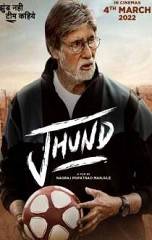Jhund is a sports drama film written and directed by Nagraj Poptrao Manjule, based on the life of Vijay Barse, who founded the NGO Slum Soccer. The film is produced under the banners of T-Series, Tandav Films Entertainment and Atpat Films. It stars Amitabh Bachchan in the lead role, while Akash Thosar, Rinku Rajguru, Kishore Kadam and others play important supporting roles.
Amitabh Bachchan plays the role of Vijay Borade who is a professor in a college in Nagpur. Despite the raw gritty nature of their play, he is pleased with the football skills of the children in the nearby slum. Children get involved in many crimes like pickpocketing, stealing coal from trains, drugs etc. How he organizes into a football team and brings them out of crimes is the rest of the plot.
With a runtime of around three hours, Swarm takes its own sweet time setting up the locations and characters. Nagraj Manjule handles the film the same way Pa Ranjith does with his films. He chooses a location and fills it with characters closer to reality. Even if you don’t know the backstory you will still be able to understand everyone inside the frame.
It is well known that Nagraj Manjule has been vocal about politics in his films and this is no different. There are lots of frames with Ambedkar, Jyotirao Phule and Chhatrapati Shivaji in background. There is a song just before the interval which is an unmatched celebration of Ambedkar Jayanti, which has not been captured by any other mainstream film till now. Part of the game has its clichés but they are well caught.
They have also pulled out most of their actors, most of whom are newcomers. Amitabh’s monologue in the climax will remain one of the most memorable scenes in Indian cinema along with his climactic monologue in Pink. The newcomer, who plays slum footballers, fits the role and exudes ease in front of the camera.
Ajay Atul’s songs help in the cause of the film and they appear at the right time. But there is another hero in Saket Kanetkar. His background score is the soul of the bunch and the voice is genuine. There is a scene where one of the characters introduces himself as a musician and plays Saare Jahan Se Achcha on his Bulbul Tara. When the same character dies, Saket plays the same score and it makes you emotional. There are a lot of birds-eye shots in the cinematography depicting how slums are perceived by the upper classes.
Overall, the film keeps you hooked for most of the time, but the second half could have been a bit shorter. Technically, the film has set its own standards. There are a plethora of Easter eggs and symbols on which a separate essay could be written.
Decision: The herd is essential to its solid content and politics.




